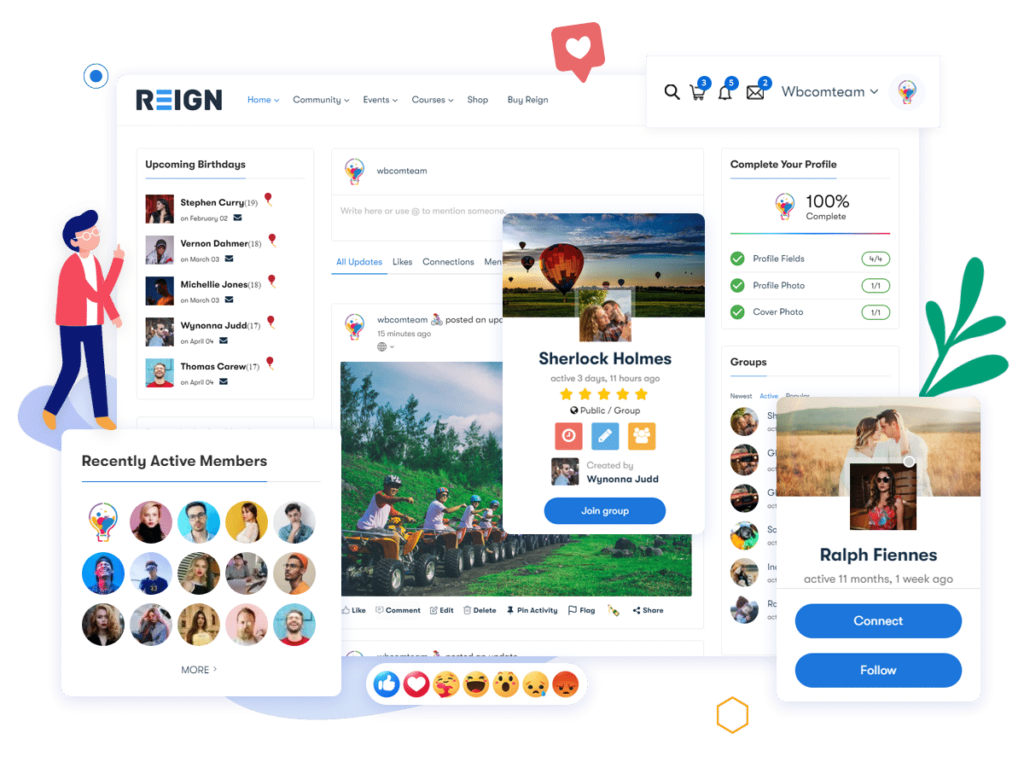Are you thinking of creating an online community using Facebook groups? Hold on, and think again! While Facebook groups may seem like the perfect solution for building a thriving online community, they come with many overlooked disadvantages. From privacy concerns to low engagement rates, Facebook groups can do more harm than good to your online community. In this blog post, we will explore why you shouldn’t use Facebook groups to create an online community and provide you with alternative solutions to help you build a successful and sustainable online community. Along with the disadvantages of Facebook groups. So, before you hit that “Create Group” button, read on to learn why Facebook groups might not be the best option for your online community.
Try Reign Theme DemoBuy Reign BuddyPress Theme and Reign addons bundle add-onto create a highly engaging Community Platform Today!
Table of Contents
ToggleLack of Control | Disadvantages of Facebook groups
It is one of the most basic disadvantages of Facebook groups:
A. Facebook controls what happens in Facebook groups:
Facebook controls Facebook groups and can change groups’ policies, features, and functionalities. Facebook’s terms of service dictate what is allowed or not allowed in groups. The platform also has the power to remove groups, group posts, and group members without prior notice. This lack of control over your online community can be problematic if you want to create a safe and stable space for your members.
B. Examples of Facebook’s control over group members:
Facebook’s algorithm decides what content is shown in members’ feeds, which means that your group’s content may not reach all your members. Additionally, Facebook can collect and use data from your group members, which may not align with your group’s goals or values. Lastly, Facebook’s moderation team can remove group members if their behavior violates the platform’s terms of service, even if it is not explicitly prohibited in your group’s rules.
C. Consequences of lack of control over your online community:
If you lack control over your online community, you risk losing the trust and engagement of your members. Members may feel uncomfortable participating in a space where they don’t know what rules are enforced or how their data is used. This can lead to decreased engagement, decreased member retention, and a negative reputation for your brand or organization. Ultimately, a lack of control over your online community can lead to its demise.
Privacy Concerns
A. How Facebook handles privacy in groups:
Facebook has a complex system of privacy settings that allow group administrators to control who can see and join their groups. However, Facebook still collects data on group members and may use it for its purposes, such as targeted advertising. Additionally, group members may not know how their data is used or who can access it.
B. Examples of privacy breaches in Facebook groups:
There have been numerous privacy breaches in Facebook groups, where group members’ personal information was exposed to people who were not authorized to see it. In one such instance, a Facebook bug caused private group information to be made public. In another instance, an online marketing company was able to scrape data from millions of Facebook group members without their consent.
C. Consequences of privacy concerns for your online community:
Privacy concerns can lead to a lack of trust among your group members, decreasing engagement and lower member retention. Additionally, privacy breaches can lead to legal issues and damage your brand or organization’s reputation. Suppose your group members feel that their privacy is not being respected. In that case, they may be hesitant to share personal information or participate in discussions, which can limit the potential of your online community.
Low Engagement Rates
A. How Facebook’s algorithms affect engagement in groups:
Facebook’s algorithm controls what content is shown in members’ feeds, and this can limit the reach of your group’s content. The algorithm favors content that generates high levels of engagement, such as likes, comments, and shares, so if your group is not generating this type of engagement, it may not be shown to many members. Facebook’s algorithm may also prioritize content from friends and family over group content, reducing your group’s reach.
B. Examples of low engagement rates in Facebook groups:
Low engagement rates can be observed in Facebook groups with little discussion or interaction between members. Members may not feel motivated to engage with each other if the content is not relevant or engaging. Additionally, if group administrators are not actively managing or encouraging engagement, the group may become stagnant and lose members over time.
C. Consequences of low engagement rates for your online community:
Low engagement rates can decrease member retention and value for your online community. If members are not actively participating in discussions, the group may not fulfill its purpose, leading to decreased trust and reputation. Additionally, low engagement rates can make attracting new members to your group challenging, as potential members may see the lack of activity and perceive the group as inactive or irrelevant. Ultimately, low engagement rates can limit the potential of your online community and make it challenging to achieve your goals.
Advertisements and Distractions
A. How Facebook’s advertisements and distractions affect groups:
Facebook’s primary revenue source is advertising, reflected in the platform’s approach to groups. Facebook may display advertisements within groups, which can be distracting and disruptive to members. Additionally, Facebook’s design and layout can be distracting, with notifications and other features distracting members from group content and discussions.
B. Examples of advertisements and distractions in Facebook groups:
Advertisements in Facebook groups may appear as sponsored posts, which can be difficult to distinguish from organic content. These advertisements can occupy valuable space on members’ feeds and may not be relevant to the group’s interests or goals. Additionally, notifications from other Facebook features, such as messages and friend requests, may distract members from engaging with group content.
C. Consequences of advertisements and distractions for your online community:
Advertisements and distractions can decrease the quality and value of your group’s content, decreasing member engagement and retention. Members may feel frustrated or annoyed by the distractions and may be less likely to participate in discussions or share their content. Additionally, if the advertisements are irrelevant to the group’s interests, they may be perceived as spammy or irrelevant, damaging the group’s reputation. Ultimately, advertisements and distractions can limit the potential of your online community and make it challenging to achieve your goals.
Alternative solutions for building an online community
In addition to the alternatives mentioned earlier, another option for building an online community is creating a website using WordPress. WordPress is a famous website builder that offers a variety of community-building features, such as discussion forums, user profiles, and member directories. With WordPress, you can customize the look and feel of your website and integrate it with other tools and platforms to create a robust online community.
Creating an online community website using WordPress offers several advantages compared to other solutions. For one, it allows for more control over the design and functionality of the community. You can customize your website to suit your community’s needs and goals better and add features and functionality as needed. Additionally, an online community website can provide a more professional and branded appearance, which can be important for communities focused on networking or business.
While creating an online community website using WordPress may not be the best solution for every community, it offers many advantages over other options, especially for communities looking for a more branded and professional appearance. However, it may require more technical expertise and resources to set up and maintain, so it may not be ideal for those with limited resources or technical skills. Ultimately, it is important to evaluate your community’s specific needs and goals and choose the platform that best suits those needs.
Wrapping Up Words | Disadvantages of Facebook groups
In this blog post, we examined the disadvantages of Facebook groups in building an online community. We have discussed Facebook’s control over groups, privacy concerns, low engagement rates, advertisements, and distractions. We have also explored alternative solutions, creating an online community website using WordPress. Additionally, we have highlighted the advantages of creating an online community website from scratch using WordPress. This can help you build a more professional and engaging community that reflects your brand and mission better. If you currently use Facebook groups to build your online community, exploring alternative solutions may be worth exploring.







